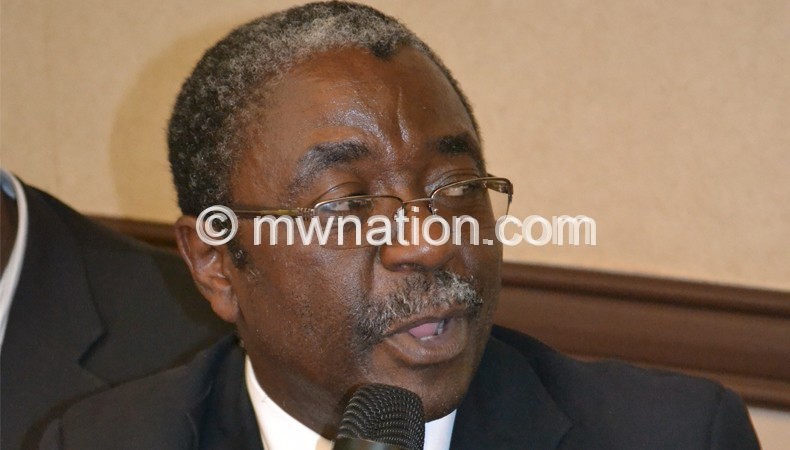Experts weigh in on death penalty
As the debate on death penalty heightens and international pressure mounts, some legal minds have suggested it is time stakeholders started lobbying for law reforms.
University of Malawi law professor Edge Kanyongolo on Friday said the way forward on this matter is for any interested person or organisation to lobby for, or initiate, the necessary law reforms.
“Abolition of the death penalty requires a set of amendments to the Penal Code which could be by way of either a Public Bill or Private Member’s Bill,” he explained.
On his part, University of Cape Town law professor Danwood Chirwa said in a response to a questionnaire that Malawi’s position on the death penalty is already progressive.

He said: “That is why there hasn’t been a pressing need to abolish the penalty by statute. Malawi is abolitionist in practice, meaning that the death penalty has not been carried out for a long time, almost three decades.
“Death row inmates get their sentences commuted to life sentences regularly. Lastly the courts have long held that the penalty cannot be imposed mandatorily: the trial judge must consider mitigating and aggravating factors and impose a sentence that is proportionate.”
Chirwa said the effect of this has been the reduction in number of cases where the death penalty has been or could be imposed.
He explained: “In short, it can only be imposed in the gravest kinds of criminal brutality. Even in those cases, the penalty hasn’t been executed.
“As you can see, anyone who tries to create the impression that Malawi’s death penalty position is backward or an urgent issue that requires addressing is misleading the public.”
Meanwhile, Centre for Human Rights, Education, Advice and Assistance executive director Victor Mhango has said government has not pushed for the abolition of the death penalty because there was lack of momentum on the need to reform.
He said: “Death sentences were not being handed out until recently when there were many killings of people with albinism, causing many organisations to speak out against it.
“Furthermore, it comes more with what the general public will think and respond to such a
change if death penalty were to be abolished in Malawi because not everyone is receptive to the idea of abolishing death penalty as seen with instances of mob justice where people take the law into their own hands.”
Mhango, whose organisation works closely with prisons, said the way forward was to raise awareness in communities and the country as a whole so that people are aware of the negative impacts death penalty has on an individual and educate people on the international laws which bind Malawi.
He said: “There is a lot of emotional torture among those on death row and do not know when they will be executed. Once people’s minds have shifted from that notion, they will be more receptive to abolishing death penalty.
“The State at times is under pressure to make reforms because they are not sure how people will react to such changes, resulting in them being idle on other situations.”
Mhango said killing an offender would not reverse the act the person committed.
All administrations under democratic Malawi have not tackled the death penalty, with no single president signing a death warrant since 1994.
Former legislator Henry Phoya, who also doubled as Minister of Justice and Attorney General (AG) from 2002 to 2003 and Minister of Justice and Constitutional Affairs from 2004 to 2009, said during his time, the issue of maintaining or abolishing the death penalty was never brought before Parliament.
He served in those capacities during the administrations of Bakili Muluzi (United Democratic Front-UDF) and Bingu wa Mutharika (Democratic Progressive Party-DPP).
In a written response on Tuesday, Phoya recalled that on two occasions, the issue was a subject of national debate and traditional leaders strongly spoke against the abolition of the death penalty, a penal laws Malawi inherited from its colonial masters, the British.
He said: “In the face of such strong opposition, we decided against taking this issue to Parliament. The decision not to bring before Parliament a law abolishing the death penalty was premised on the cardinal rule of not enacting laws that run counter to the prevalent and deep-rooted norms of society whose conduct and behaviour such laws seek to regulate.
“It is, however, pleasing to note that, by and large, many Malawians are now gravitating towards the belief that the death penalty is inherently inhumane.”
On his part, George Chaponda, another former minister of Justice under the Bingu wa Mutharika administration, said in an
interview on Wednesday he did not recall the death penalty being a subject of discussion before Cabinet.
Meanwhile, UN Human Rights spokesperson Marta Hurtado issued a statement in Geneva on August 26 2021 on Malawi’s position that the punishment remains applicable.
In the statement, she said: “The recent decision coming four months after public delivery of a final judgment under Malawi law, raises serious concerns on the due administration of justice, and has the effect of now allowing judges to resume imposing the death penalty.
“The death penalty is, by its nature, inconsistent with a State’s duty to protect the fundamental right to life, and there is no evidence globally that it has a deterrent effect on serious crimes.”
It further stated that the court’s recent clarification, the UN said, does not prevent the government and the Parliament of Malawi from taking steps to formally abolish the death penalty in the country through legislation.
The United Kingdom government also issued a statement on August 20 2021 opposing Malawi’s position that death penalty is still part of its laws.
A recent Supreme Court of Malawi ruling clarified that the country never abolished death penalty and that High Court judges are free to sentence murder convicts to death.
Over 30 countries in Africa have the death penalty in their books, but just half carried out execution in recent years.






One Comment